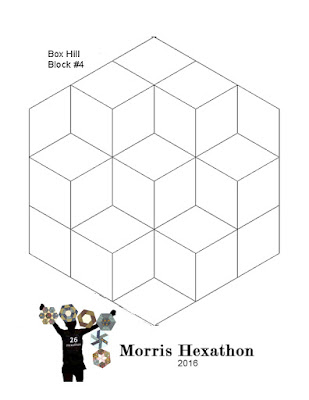Morris Hexathon Block 4: Box Hill by Becky Brown
This week's block is a variation on the classic box design,
what we might call Baby's Blocks.
Collection of the Brooklyn Museum, 1880-1900
The design is another one of the hexagonal blocks that we see in 19th-century quilts...
Perhaps influenced by Italian mosaics such as this floor at Pompeii.
The geometry is ancient.
We actually see a simple version of the design as cheater cloth---
printed patchwork---from about 1840 or earlier,
The block in a late-19th-century silk quilt from the
Massachusetts project and the Quilt Index
Box Hill by Bettina Havig
The pattern fits a hexagonal block. It's just one piece---but 27 of them.
I named it for Box Hill in the Surrey hills, a feature in the English landscape that was a venerable tourist attraction when George Lambert painted it in 1733. Jane Austen's fictional Emma's visited and so did William Morris.
The View from Box Hill.
Emma and friends picnicking in a BBC production.
Below the pattern for English Paper-Piecing.
Pattern for an 8" Hexagon
(4" sides)
To Print:
- Create a word file or a new empty JPG file that is 8-1/2" x 11".
- Click on the image above.
- Right click on it and save it to your file.
- Print that file out 8-1/2" x 11". The hexagon sides should finish to 4" across.
- Adjust the printed page size if necessary.
- Add seams when you cut the fabric.
I found two published names for BlockBase #240:
- Tea Box from the Farm Journal
- Diamond Cube from the Ladies Art Company
Diamond Cube
An example made by Mary Gentry about 1910 from the Tennessee Project
and the Quilt Index. The Ladies Art Company may have been her source.
Here's another version from about 1900-1910.
It's hard to see how this one's constructed
An option--- BlockBase #240
Exactly the same pieced design but shaded and set differently
From Julie Silber's collection.
It's all the same pattern, rotated and shaded to different effect.
One More Inspiration
Just to confuse you.
This one's not #240.
An Alternate
I designed this series to be pieced over paper. Another option is to piece this simplified version conventionally. Or save it for later. As the hexies get more difficult you might want an easy block on file.
It's a 60 degree diamond with a 4" finished side.
























Thank you Barbara. xx
ReplyDeleteWow, that brought back some memories. My sisters and I were at boarding school near London in the seventies. The nuns organised outings for us some weekends. One favourite was Box Hill. We had a packed lunch (which a group of us would make, for some reason we thought it was fun!). The coach would drop us off at the bottom and we were told what time to be back, usually around four in the afternoon. We just explored, I seem to remember there was a place to buy ice creams some where near the top.
ReplyDeleteCan you imagine taking a group of girls ages 9 - 18 and just leaving them to explore these days?
Somewhere I have a photo of my younger sister at Box Hill.
I think I'll probably make the simplified version. It's been 25 years since I did "patchwork" - which is what we called it in England - and I'm not very proficient at it. I've only just finished block 1.
Helen
Looks like a lovely place for an excursion. Nice block, but more challenging :) I won't get to it till after the weekend.
ReplyDeleteThanks for showing how versatile this block is.
ReplyDeleteLoving your hexathon ; working on nr 3 and anxious to work on this new one.
ReplyDeleteI'll for sure order your new fabric Line, and specially these blue ones, which are wonderful.
Will you attend the Chicago quilt show next year in April ? My quilting friends and I would very much appreciate to have the opportunity to meet you.
Our group of travelling quilters is called Quiltinusa and you can visit us at this address www.quiltinusa.blogspot.com.
Thanks again for these patterns and stories.
Martine from Quiltinusa
I love the fabrics and the hexies! I must admit though, I do not have a clue how to construct Box Hill.
ReplyDelete